The programme for Janáček Brno 2024, an international opera and music festival now in its 9th year, was unveiled at a concert held to mark this occasion entitled Janáček to the start! On Saturday, 4 November, the Mahen Theatre was filled not only with devoted fans of the festival, but also with foreign journalists, politicians and prominent figures from the world of culture. In addition to a collection of wonderful musical performances, the audience was also treated to a lineup of renowned artists – Kateřina Kněžíková (soprano), Václava Krejčí Housková (mezzo-soprano), Josef Špaček (violin) and, last but not least, Robert Kružík, who took on the role of both conductor leading the Orchestra of the Janáček Opera at the National Theatre Brno during the evening and also performing as a cellist.
The event was also graced by the presence of Minister of Culture Martin Baxa, who announced during a speech by Martin Glaser, Director of the National Theatre Brno, that the Janáček Festival Brno would be entering into cooperation with the Ministry of Culture of the Czech Republic and that a memorandum would be signed regarding financial support for the event in 2024 and 2026. Both men signed this memorandum in front of the audience. To date, only two Czech festivals enjoy similar cooperation with the ministry, these being the Karlovy Vary International Film Festival and the Prague Spring International Music Festival.
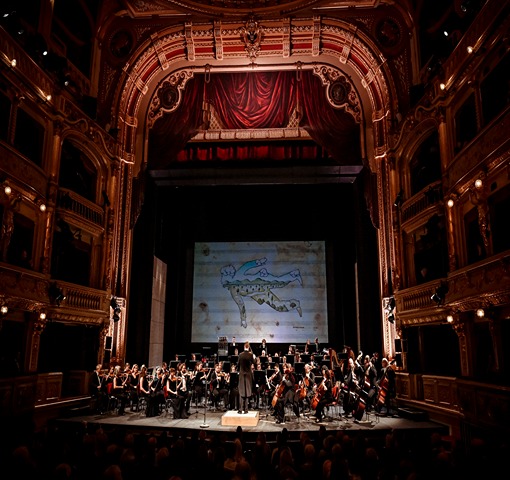
The evening began with a rendition of Suite Rustica Op. 19 by Vítězslava Kaprálová, a composer of the early 20th century born in Brno. Unfortunately, the performance of this work by the Orchestra of the Janáček Opera at the National Theatre Brno left the opening piece of the evening sounding very uneven and rhythmically scattered, as if the players were still just warming up. On the other hand, the melodious, cleanly played oboe solos and a certain plasticity – malleability in the dynamics during the third movement were notable highlights. In the aria of Svatopluk Čech from Janáček’s opera The Excursions of Mr. Brouček, the audience was introduced to baritone Tadeáš Hoza, whose performance I have no complaints about. The orchestra itself also sounded more settled, more coherent and more colourful in its playing.
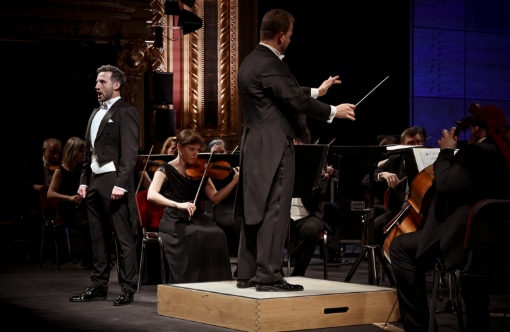
The first part of the concert ended with a rousing performance by violinist Josef Špaček and Dvořák’s Concerto for Violin and Orchestra in A minor, Op. 53. The penetrating, rich and “juicy” tone of the performer’s violin stood out especially in the cantabile, romantic passages, which were interspersed with technically demanding movements full of scale runs, octaves or other double stops – played with absolute ease by Špaček. The performances by the French horns were also a resounding success, especially the moment when the French horn switches from its solo part to the accompaniment with a sustained note. The connection between the soloist and the orchestra was superbly coordinated by the conductor Robert Kružík, who often turned to the violinist while he was playing (not only due to the timing of his entrances) to ensure better communication. Špaček, as the piece itself demands, occasionally adjusted the tempo, but always very tastefully and with feeling. This, of course, made it difficult for the conductor, who attempted the whole time to defer to the violinist, to follow his tempo and to get the orchestra to follow his lead. Albeit with occasional hesitations, musically this was an excellent experience which worked perfectly as a way of enticing people to attend the concerts in the upcoming ninth edition of the festival.
In fact, room was also given to this topic after the interval, when the dramaturg at the Janáček Opera Brno, Patricie Částková, and the artistic director, Jiří Heřman, introduced the main motto of Janáček Brno 2024 – Without Borders and outlined the programme for the festival. We can, for example, look forward to The Excursions of Mr. Brouček opening the festival, directed by the world-famous opera director Robert Carsen and scored by Marko Ivanović in co-production with Teatro Real Madrid and the Berlin State Opera, as well as The Makropulos Affair performed by the Berlin State Opera, the original version of Jenůfa from 1904 staged in collaboration between conductor Anna Novotná Pešková and director Veronika Kos Loulová, and the opera The Charlatan by Janáček’s pupil Pavel Haas, directed by Ondřej Havelka. As far as concerts are concerned, these being strongly oriented towards the Year of Czech Music, the concert of the Bamberg Symphony with conductor Jakub Hrůša is definitely worthy of attention. The festival will close with the opera The Cunning Little Vixen directed by Jiří Heřman, where we can look forward to performances by Adam Plachetka (the Forester) and Kateřina Kněžíková (Sharp Ears).
This singer drew attention to herself during the reviewed evening in several performances in which she sang well-known arias or duets (together with her colleague Václava Krejčí Housková) from Janáček’s operas. We were reminded of the drama of this piece with the protagonist’s prayer from the veristic work Jenůfa, which the singer underlined with a gentle pleading expression; with the vocal number “Why Can’t People Fly Like Birds” from Katya Kabanová, we found ourselves on the plane of infatuation and the despair which springs from this. The poignant, dreamy yet naïve dialogue between the two singers portraying friends depicts the plight of the protagonist (Kněžíková), who confides in her friend (Krejčí Housková) about an evil whispering in her ear. Exposed melodies, unnaturally large intervals and use of a higher range place great demands on the soloist, which Kateřina Kněžíková coped with adequately – albeit with the occasional deterioration in the clarity of the lyrics.
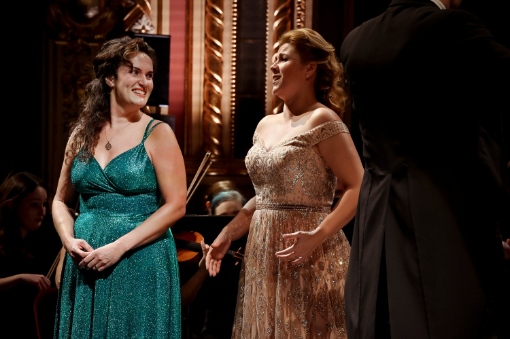
Pavel Haas was remembered with his Overture for Radio for small orchestra, four male voices and recitation composed in celebration of radio broadcasting and one of its pioneers, the Italian physicist and inventor Guglielmo Marconi. The lyrics by the composer’s brother Hugo Haas are not only celebratory, but also humorous to a certain extent – a farce. The composition itself gives the impression that it is a work rooted in the furtherance of socialism, an impression which the convincing performances of the reciter Pavel Čeňek Vaculík and the singers Tadeáš Hoza, Ondřej Koplík, Vít Nosek and Jan Šťáva also contributed towards. The number brought a breath of fresh new air to what was already a demanding and lengthy programme.
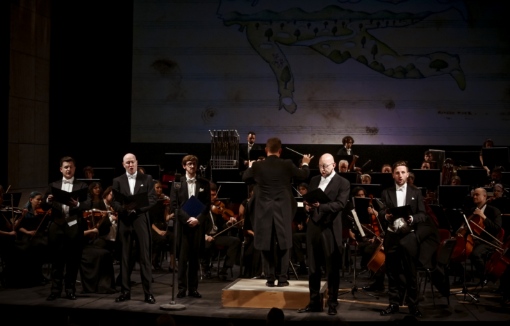
Things were no different in the case of two works by Bohuslav Martinů. In Variations on a Slovak Folk Song for Piano and Cello with orchestral instrumentation by Martin Wiesner, the role of soloist was taken by Robert Kružík, who surprisingly handed over the conductor’s baton to Josef Špaček. Martin Wiesner’s orchestration plays with the melodic line of the cellist, whose part it either adopts or merely accompanies on the principle of contrasting texture. The imaginative passages in which the wind instruments alternate with the full sound of the orchestra or other instrumental sections make the accompaniment much more colourful in tone, and as a result the overall feel of the piece was not dull. Robert Kružík did credit to his part –most definitely showcasing his musical versatility. During his career, Josef Špaček has undoubtedly gained a lot of experience playing with orchestras and guiding them under his baton, and in recent years he has in fact been performing much more on concert stages as a conductor. Špaček also confirmed these qualities by conducting the Brno Opera Orchestra, which did, however, exhibit certain shortcomings. Leaving aside the conducting style as such, his leading of the orchestra itself seemed somewhat distracted. Be this in terms of work with the left hand, just keeping time or a certain naturalness of gestures. This impression was reinforced by the very end of the Variations, in which the speed of the orchestra broke away from that of the soloist. The courage and determination with which Špaček led the ensemble are admirable and his conducting is certainly worthy of appreciation. The overture, serenade and finale from Martinů’s ballet Who is the Most Powerful in the World worked well again as lighter pieces, with which came comicism, playfulness in the form of expressive rhythms or a final parody of the finesse of classical works. The performance given by the theatre orchestra was harmonious, homogeneous and expressively varied. The wandering part of the solo viola, supported at times by clarinets and flutes, was particularly interesting from the point of view of its timbre.
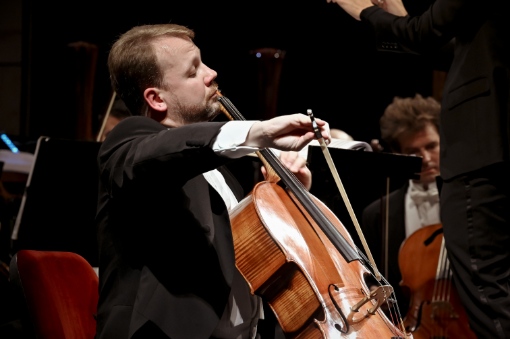
The end of the concert, as will be the case at the end of the festival itself, belonged to the opera The Cunning Little Vixen. Kateřina Kněžíková (Sharp Ears) and Václava Krejčí Housková (Gold Stripe) offered the audience a glimpse into the upcoming production with their duet, which followed the previously mentioned lighter note. Both in terms of singing and acting this was an adorable courting scene, followed by the last number of the evening – a duet between Svatopluk Sem (the Forester) and Adela Plachetková (Skokánek the little hare), again with a superb performance by both artists.
The evening of tasters accomplished everything it set out to do. The audience was treated to the unveiling of the absolutely packed festival programme for Janáček Brno 2024. But at the same time, they were already able to enjoy some wonderful early performances of works by artists they can look forward to seeing again next year.
Programme:
Vítězslava Kaprálová: Suita Rustica op. 19
Leoš Janáček: The Excursions of Mr. Brouček – Aria of Svatopluk Čech No. 16
Antonín Dvořák: Concerto for Violin and Orchestra in A minor, Op. 53, B108
Pavel Haas: Overture for Radio for small orchestra, four male voices and recitation
Leoš Janáček: Jenůfa – Jenůfa’s Prayer
Bohuslav Martinů: Variations on a Slovak Song (instrumentation by Martin Wiesner)
Leoš Janáček: Katya Kabanová – Katya’s scene “Why Can’t People Fly Like Birds”
Bohuslav Martinů: Suite from the ballet Who is the Most Powerful in the World
Leoš Janáček: The Cunning Little Vixen – duet of the Vixen and the Fox and the end of the opera
Robert Kružík – Conductor, Cello
Kateřina Kněžíková – Soprano
Václava Krejčí Housková – Mezzo-soprano
Svatopluk Sem – Baritone
Josef Špaček – Violin
Tadeáš Hoza – Baritone
Ondřej Koplík – Tenor
Vít Nosek – Tenor
Jan Šťáva – Bass
Pavel Čeněk Vaculík – Recitation
Orchestra of the Janáček Opera at the National Theatre Brno
4 November 2023 at 7:00 pm, Mahen Theatre




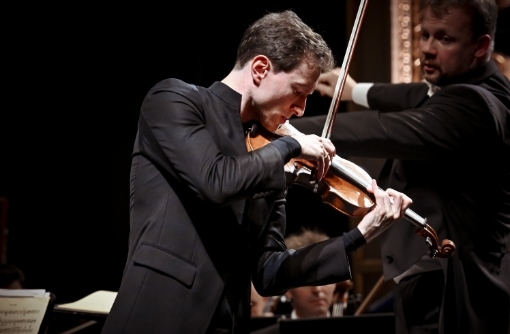



























No comment added yet..